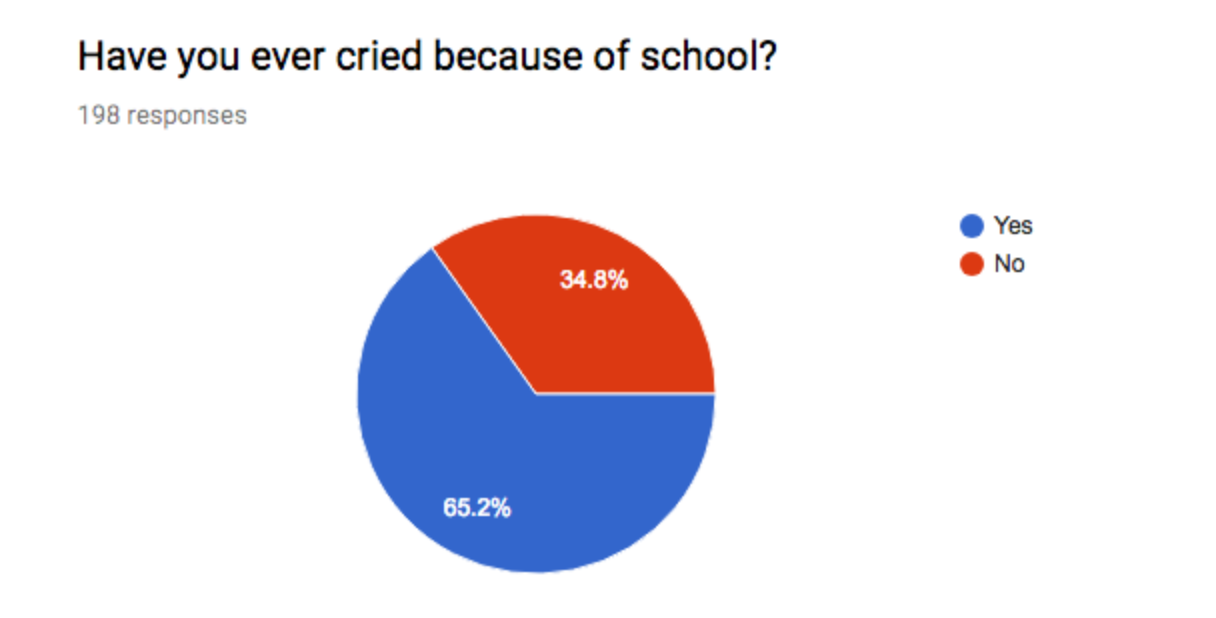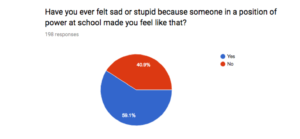By Danny Tow, Sports Editor
River Hill High School has long been known as a top high school. Whether it be for academics or athletics, River Hill is consistently near the top of any rankings when put up against other high schools. But the pressure of living up to those expectations has taken a drastic toll on the student body.
According to the results of a recent survey conducted entirely amongst River Hill students, a majority of respondents said that they get less than 7 hours of sleep per night, have gotten a bad grade on a presentation, test, or project because of anxiety, and have felt demeaned by teachers or administrators at school, while a large majority of students responded that they have cried because of school, and have had to sacrifice their mental health in order to get a good grade.
One anonymous female Junior said that she gets 4-6 hours of sleep on an average night because of her schoolwork. “I get less than 7 hours of sleep per night partly due to procrastination but also due to the workload that I get from the classes I am taking,” she said. “For example, there is always at least [one] day a week/every two weeks where I have at least one test and one project due on that same day so sleeping that night before is not a priority.”
A female Senior agreed with the sentiment that she has prioritized schoolwork over mental health on multiple occasions, saying that, “In situations where I am overworked and need a mental health day to relax and regenerate, I have to sacrifice that time to [do] more homework because I often don’t get a break from class and homework.”
Assistant Principal Fairley agreed with the students that homework is likely a reason that many students lose sleep, but not because they are overloaded with work. Rather, she says the reason is that many students feel a need to participate in as many activities as possible, and thus don’t leave themselves the time to complete the homework. However, she did point out that this as well is not the fault of the individual students, but instead of the culture which her generation has created for their kids, one of competitiveness and a drive to outdo others.
Additionally, student’s mental health issues aren’t confined to outside of the schoolhouse gate. 59% of survey respondents admitted that they have, at least once but for most several times, felt demeaned or put down by a teacher or administrator at River Hill.
Many students went so far as saying that a teacher has made them feel unintelligent for asking a question about an assignment, such as another female Senior who responded that she, “asked a question, and [the teacher] made rude comments such as ‘How did you not know that?’ in front of the whole class,” or a male Junior, who responded that a certain teacher, “made me cry several times, demeaned me, and when I tried to ask for help she talked me down in front of the class several times. [She] said I wasn’t trying hard enough after spending hours on [homework].”
A male Senior simply responded that his teacher called him, “dumb and stupid for having trouble understanding the information that she was trying to teach.”
One student said that some of her teachers have told their classes that if any students don’t understand something the teacher said, then they are behind. When those same students tried to ask questions about the material, the teachers refused to answer, told the students to come after school, and moved on with the lesson.
A female Junior says that they went so far as “transferring out of [a] class,” because the teacher, “made me feel so worthless and inadequate.”
Mrs. Martin said that she doesn’t deny the validity of the student’s feelings and that the problem then lies with teachers mistaking their relationships with students. She explained that teachers often know which students they are able to joke around with and talk sarcastically to and that the root of this problem comes either from teachers misreading those relationships, or students hiding their emotions really well.
Martin went on to say that, if this problem is truly occurring, then it is leading to a less conducive learning environment, because students who feel this way about teachers are thus activating a certain response in their brain that prevents them from focusing clearly on what else is being said in that class.
Moreover, the mental health issues for students extend from normal class time to quizzes and exams. Several students stated that they have been unable or nearly unable to complete high stakes assignments (such as a presentation or test) because of anxiety. One female Junior said that “every test is a struggle,” because of her anxiety, while another said that, even though she always finishes her assignments, she has to, “take time to breathe and relax and get comfortable with my surroundings.”
In addition to all of the problems within the school that schoolwork, teachers, and pressure have caused, many students have said that they need to seek outside medical help because of school. Of the 15% of respondents who said that they are currently seeking outside medical help from a mental health professional (such as a therapist or psychiatrist), 52% said that the reason is school-related, with just 10% saying that the reason they are visiting a mental health professional is not school related.
Clearly, this is a problem that is affecting a large percentage of the student body of River Hill. Hopefully, these results and this article can spur change, so that every student can be a healthier version of themselves.



